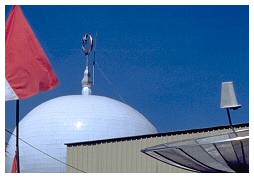 This is the first in a series comparing the social impact of theological differences between Christianity and Islam.
This is the first in a series comparing the social impact of theological differences between Christianity and Islam.
I believe that people become like what they worship, and people relate to one another based upon the way that they relate to God. If religions matter and if religions are different, then different civic structures will emerge from different religions. But popular culture resists information that challenges its prevailing conviction that all religions are basically the same. It sees what it expects, and it overlooks what it doesn’t.
Recent research shows that the religion of “no-religious-affiliation” is the fastest growing religious position in America. This group’s influence on popular thought throughout all of America is stunningly profound. If religion is irrelevant, then all religions are basically the same. And if all religions are basically the same, then different religions do not result in different civic structures, and civic structures become interchangeable between societies that are practicing different religions.
This emerging belief system impacts both secular and Christian institutions. On the secular side, it is the foundation for the failure of peacekeeping efforts in the Middle East and Central Asia. On the Christian side, it undergirds efforts to create a Jesus movement within Islam.
In this series, I will challenge conventional popular wisdom about religion. I will demonstrate that Islam and Christianity are fundamentally different. I will compare and contrast Muslim and Christian beliefs about God (theology), man (anthropology), nature (cosmology), salvation (soteriology), end-times (eschatology), and revelation. I will show how different beliefs result in different values that result in different social behaviors.
On the secular side, Western civic structures are founded in a Judeo-Christian religious heritage. Conversely, Middle Eastern and Central Asian civic structures are founded in a Muslim heritage. Civic structures cannot survive without underlying values that are based upon popular beliefs. Structure for government, justice, education, public works, civil defense, marriage, family, and more must have points of contact with underlying values. Structures functioning in one religious heritage cannot survive inside another without adapting so that they have points of contact in the values based on the beliefs of the other system. Such adaptation is not possible when the people attempting to transplant the structures believe that all religions are basically the same.
On the religious side, not everyone who professes to be a Christian is truly following Jesus and is “saved” according to an Evangelical perspective. Furthermore, some people who call themselves Muslims are actually or secretly following Jesus. As a result, many Evangelicals are embracing the popular notion that Muslims and Christians worship the same God. That leads to religious structures being interchangeable. It means that Muslims can follow Jesus and remain in Islam while Christians can worship in Mosques and celebrate Muslim holidays without committing idolatry. But if the Muslim and Christian gods are different, then worshipping in a Mosque would be idolatry for someone following Jesus, and worshipping in a church would be idolatry for someone following Muhammad.
Follow this series and then decide for yourself. Can Western civic structures bring peace and prosperity to the world of Islam? Can Muslims follow Jesus and remain inside Islam?
Link through the chart to other posts on the social impact of Muslim and Christian theology:








 Act Beyond
Act Beyond http://www.faithandwar.org
http://www.faithandwar.org Mark Durie's Blog
Mark Durie's Blog Military Missions Network
Military Missions Network The Christian Fighter Pilot
The Christian Fighter Pilot The Navy Christian
The Navy Christian
I am thankful for your blog. I have attempted to secure some printed content on the tenants of Islam. Actually, a theological dictionary or at least a glossary of terms.
I look forward to receiving more from you.
Looking forward to your blog posts on “no religion” and “is Islam different from Christianity?”
1) I think Judaism is “implicitly trinitarian”, though of course, every Jew is trained to object to such a claim. Nevertheless, two arguments I can make to support this are:
a) The word “God” in Genesis 1:1 and following is always plural–“Elohim”. This is not merely a convention, because the pronouns are likewise plural “Let us make man in our image”. There are numerous other grammatical indications that the Jewish God is not singular, but of course, many verses that also have him in the singular, such as the famous “Shma Yisrael Adonai Elohanu, Adonai Ichad” The only solution to this conflict of language is something resembling a Christian Tri-Unity. (Bi-Unities have all kinds of problems, not least is their tendency to decay into a Zoroastrian sort of Gnosticism.)
b) The idea of “personality” or “person” is a peculiarly trinitarian concept. This argument is a lot longer to explain, but easy to demonstrate. If a religion is strictly monotheistic–like Islam–then God is unknowable, non-personal, arbitrary, dominant, transcendent, etc. If a God can communicate with us, then God is immanent, changeable, persuadable, local, super-human but not supra-human, e.g. Hindu. The only way to have a Jewish God, one that talks to us and yet is Lord of the Universe, is to have some sort of essential tension, some sort of immanent-transcendent mixture, and if one works through all the various Christian heresies, one finds that the only way to do this is with the Trinity. So rather than start with the esoteric Trinity, we can start with the very understandable “Person” to show that God must be Trinitarian.
2) What this argument means, is that both Judaism and CHristianity have a form of deity that cannot be expressed in either Islam, Deism, Unitarianism, Hinduism, Zoroastrianism etc. Thus, at a very very basic level, Islam is not the same as Christianity because the properties of God are so completely foreign.
3) However, and this is a big however, this is not to say that CHristianity hasn’t affected Islam, or Islam affected Christianity. My own (poorly substantiated) opinion, is that most of the errors of Catholicism that were rejected in the Reformation came through the Spanish theologians who were in the first century after the expulsion of the Moors. That is, it was Islamic influence at the Council of Trent that caused so much grief to Martin Luther and the wars of Religion. And what remains of the innovations that the Reformers rejected that predated the Moors and can’t be attributed to Islam, were introduced by the Latin break with the Greek Orthodox church in the great schism. From an Eastern Orthodox perspective, the Latin innovations were again, a dilution of the doctrine of the Trinity that permitted an inordinate emphasis on rationality, and a defective theology of the Holy Spirit. I can’t blame Islam for this one, but there was something strange going on in the Latin church in the 6th and 7th centuries that led to the adoption of the “filioque” clause and the elevation of St Jerome’s Vulgate translation.
So what is the cure?
Firstly, it is not enough that we evangelize the Muslims, with or without contextualization and sensitivity and all that jazz. Rather, we must desperately understand our own Trinitarian heritage so that when we teach about God, we understand the personal Jesus we evangelicals love to share. And secondly, this isn’t about terminology, for I don’t care if they call him Allah or Yahweh or Lord or Jesus, the important thing is that they understand his person, his nature, his love, his character–and to understand that, they must understand the Trinity. And lastly, us Christians have to get our own act together, for we must demonstrate why Eastern Orthodox, Roman Catholicism, and Evangelical Protestantism all share the same personal God.
This article is helpful to me in understanding the crucial distinction between the Muslim and Christian view of God and how that difference works itself out in our actions.